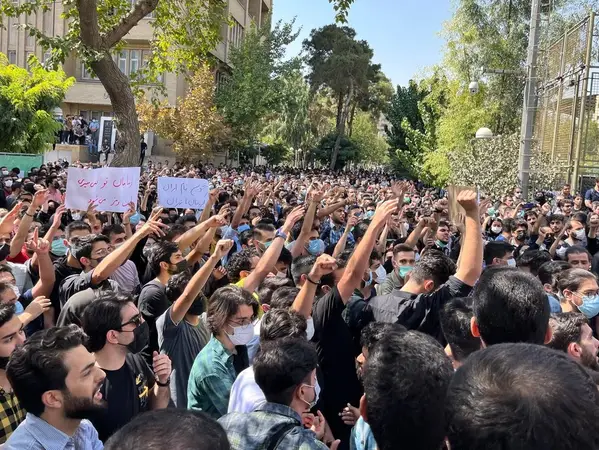A new wave of disillusionment over the legitimacy of the Iranian regime has been emerging since the death in custody of a young woman, Mahsa Amini, on Friday.
The 22-year-old from Western Iran was visiting Tehran with her brother when she was stopped by a religious police patrol controlling hijab on September 13. She was taken into a van and then to a police station. Two hours later police delivered her to a hospital in coma with fatal head injuries. Her brain tissue was damaged beyond any hope, and she died three days later.
In an interview with BBC Persian on Saturday, Hatam Ghaderi an academic who was once trusted by the founder of the Islamic Republic Ruhollah Khomeini to vet the candidates for the first presidential election in Iran in 1979, has delivered a damning verdict: "By its nature, the Islamic Republic is destructive. It destroys the religion, the country and its women and youths."
Ghaderi warned in the interview that if the Islamic Republic survives, it will leave no Iran and no religion. Ghaderi emphasized that "the Islamic Republic views women's body as a battleground."
Referring to the regime’s religious propaganda, the former revolutionary compared government injustice in Iran to what Shiites believe happened to their venerable saint, Imam Hussain, who was killed by the reigning Muslim caliph in 680. That amounts perhaps to the harshest criticism anyone can throw at the clerical regime which desperately tries to cling to religious legitimacy.
Many observers have pointed out that this extent of openness in Ghaderi's anti-regime rhetoric is unprecedented. Nonetheless, Ghaderi, as an original believer in the Islamic Republic, has been highlighting the system's shortcomings for many years. He characteristically explains complicated concepts in plain Persian equally understandable by the man in the street. He says: "We should not look at Khamenei's powers. Instead, we should see how happy Iranians are and how well-fed they are."
Ghaderi at the end of his interview warned Iranians that that after 115 years since the Constitutional Revolution, Iranians have still not managed to harness their leaders' political power. He attributed part of that failure to the "religious ignorance among part of the population." However, he said that the Islamic Republic is moving toward a collapse.
Masih Mohajeri, another orthodox believer in Iran's Islamic Revolution, wrote in an editorial in the Jomhouri Eslami newspaper on Sunday that Mahsa Amini's death and the deliberate ambiguity surrounding it "have harmed the people's trust" in the government. He pointed out that Iranians "no longer believe what the officials of the Islamic government say. This is a big loss."
Like many supporters of the regime, Mohajeri also tried to portray the incident as wrongdoing by some policemen, rather than a systemic problem. Comments like this prompt many activists to say that the people no longer wish to reform the Islamic Republic. They want an end to it as it is hopelessly unreformable.
Mohajeri believes that the Islamic principle of "prohibiting vice and upholding virtues" is necessary, but it needs to be done differently. This is in sharp contradiction to the belief of many Iranian women who reject compulsory hijab and demand freedom of choice in lifestyle.
In another development, the daughter of late Ayatollah Mahmoud Taleghani a respected cleric who died under suspicious circumstances in the early years of the Islamic Republic, and an advocate of freedom of choice for women, has said in a tweet that if her father was alive today, he would have thrown his turban on the ground in protest to the Islamic Republic's oppression against women.
Several Twitter users reminded Taleghani that she could still object to the Islamic Republic's heavy-handed treatment of women by throwing her black head-to-toe veil on the ground.
